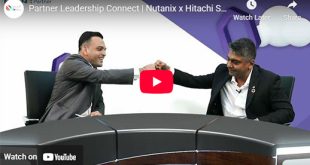K7 Computing has collaborated with Sakri IT Solutions to market their products in India. For 2015, the company’s focus is personal computing, enterprise computing and mobile devices related security. With Sakri’s deep understanding of the anti-virus market and wide channel network pan India, K7 Computing is sure to carve a niche for itself in the anti-virus markets in India. In an exclusive chat with G.D. Bepin Roy, Vice President, Consumer India, K7 Computing, ITPV finds out their go to market strategy and vision for 2015.
- What was the reason of joining hands with Sakri IT Solutions?
Sakri has lot of expertise in security domain and to reach the market they have good number of partners pan India. We preferred Sakri because they have a successful background of anti-virus products and their association with competitive brand is pretty good from last five years. Secondly, I think 80% of their business comes from anti-virus and they are more focus on the product.
- Have you developed any strategy to position the product?
With the new launches we now offer a new product called AI based technology, which is focused on Day Zero attacks. The next step in security would be to anticipate what could be the next strike and be prepared, and protect – that is what we going to deliver from the new products that we have launched.
- How important are channel partners for K7 Computing? How many channel partners you have in India?
In India, 99.9% market is channel driven. The success is defined with the geography of the country and user profile. Today everybody has a Laptop but how many really know how to use it to full capacity, how to protect your data. So here the channels and engineers play a huge role in terms of educating the customer and reaching the right product to them at the right price. So in next 50 years I don’t see channel going away in India. If you look at last 5 years, we have not spent much on advertisement compared to competition. But we are at par if not better. I think it is only with the help of channels that we are at number 3 in the anti-virus brand. We are a channel driven company.
In tier 2 cities we have 250 partners, in Tier 3 we are the only company to directly interact with 20,000 plus partners. We have a team of 100 odd people who has a reach and 150 to 250 partners are assigned to them. We have the exact profile of 20,000 partners in India and that been the main avenue of growth.
- What is the roadmap you have developed to penetrate in upcountry regions of the country?
The bulk of our partners are from class B and C cities where really the growth is happening in terms of PC penetration, laptop penetration, mobile, tablet. We have taken the route of servicing 20,000 people, out of which I am sure 16000 would be in rural areas where we directly engage and then ensure that tier 2 partners would supply in these towns. We have very strong engagement with rural and urban geographies.
- What kind of training do you give to the partners?
We are currently running a lot of training programs for our individual engineers and the engineers who work under the channel partners. We have a program called Virus hunters where we have given them codes and incentivize them based on loyalty points. We have knowledge based programs and can download information on what is latest trend. The one which we are going to roll out from March onwards is on the field. We are going to have close to 5000 training programs. It’s a small program where we go to the channel partner and train 10 people about the anti-virus and its techniques. We are trying to add profitability to the partner’s business by increasing his knowledge through this program.
- With no or less knowledge about the product among the channel partners how will you be positioning your product in the upcountry regions of India? What are the guidelines will you be developing to get profit from these regions?
We will enable the channel partner first which better for me. It is sound strategy to enable one channel partner who is in touch with other 20 customers, and then in the next level talk to engineer. We are going to the engineer level and that’s how the whole progression is going to happen. Reaching the end consumer is a very expensive way of doing it. So we are focusing to educate engineers. We will enable them better for long term loyalty.
- Quickheal is one the favored brand in western region. To compete in the market, how will you be positioning K7 products?
Traditionally geographical dominance is the characteristic of AV market. We are based in Chennai so south is the very market for us while Quick Heal is based in Pune, that region being strong for them. Rest of the market North, East and central is opened to everybody. So we are trying to break through those barriers. But I am sure things will work when you have right value proposition for the channel but the regional dominance would be there which you can’t control, but you have rest of the market to work. West being a huge market I think there is space for everybody. We have come up lot of programs which will be targeted at channel as well as the end consumer. We might proportionately focus on that bit. West is the biggest market, about Rs. 600 crores.
- Which are the potential territories for your business?
In the South, particularly in tier 1 cities, we are very strong. In the North, apart from Delhi, rest of the regions are very strong for our business. Tier 2-3 cities are potential cities for us across India as they drive local business. Ours is a derived demand and we try to tap the demands.
- What criteria do you select your partners? What are the channel programs running at present?
People who are conscious about transferring a quality product the consumers is the first criteria we select our partner and second is the commercial that we see. We largely limit ourselves to selecting t-2 partners wherein we service t-3 also.
Currently we have a channel incentive program running. We took 600 plus partners to Bangkok 49 days back. We also have partners’ engineer training program which is currently running. We keep doing small efforts for them while supporting them in participating in various schemes.
- How do you win the faith of channel partners at a time when their business is losing at the hands of OLS?
As a company we feel online is one more channel for consumer. It is a matter of convenience for a consumer to buy it but it is not a function of price. We are ensuring that MOPs are maintained at both levels. We go and talk to them whenever there is a deviation in the prices or somebody is disturbing a whole ecosystem. We have recently helped partners in Tamil Nadu and came out with the names of players who were petting the balance in the eco system. Creating an imbalance will not going to help anyone.
 Latest Technology News Today – Get Latest Information Technology Updates and Services Latest Technology News Today – Get Latest Information Technology Updates and Services
Latest Technology News Today – Get Latest Information Technology Updates and Services Latest Technology News Today – Get Latest Information Technology Updates and Services 









